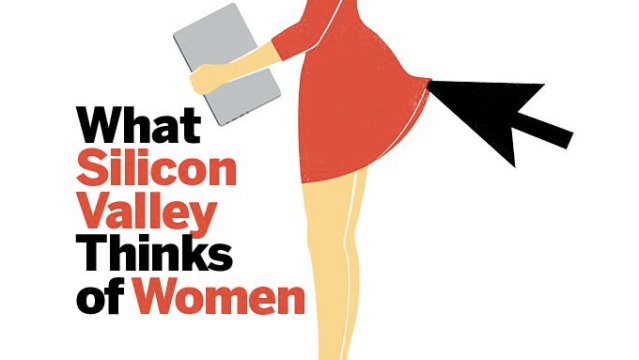An episode of On the Media‘s podcast TLDR was unceremoniously removed from the NPR website today, and people are not at all happy. Rightly so.
The TLDR episode tech blogger Amelia Greenhall calling out male “women in tech expert” Vivek Wadhwa for hijacking the media conversation about women in tech. She talked about how Vivek has set himself up as a coach for professional women — whom he believes need to brag and misrepresent themselves more, just like guys do in the tech world. In the process, he’s systematically prevented women from speaking out on their own roles in the tech industry. The upshot is that Vivek feels that Wadhwa is actually part of the problem, not a solution.
Then NPR took the show with Vivek’s opinions down. So what happened?
Wadhwa, a Silicon Valley investor and the author of a book called Innovating Women, has established himself as the go-to expert on women in tech for a variety of prestigious media organisations. With his academic credentials (he has appointments at Duke and Stanford) and entrepreneurial background, he has leveraged his accomplishments into a secondary stint as a spokesperson for diversity. The most recent Wadhwaism appears in Newsweek’s recent cover story on women in tech. “Wadhwa says shaky self-confidence is one of the chief things holding women back,” the article reads.
Many actual women (and men) in the field are frustrated that Wadhwa has positioned himself as a sort of TechLadyWhisperer. Intentions aside, Wadhwa’s voice as a spokesperson for women in tech often eclipses the voices of actual women in tech. This inspired Greenhall to write a scathing critique of Wadhwa’s patronising advocacy in a blog post called “Quiet, Ladies, @Wadhwa Is Speaking Now.” Greenhall slammed Vivek for calling himself an ally, when so many women feel that he isn’t.
She writes:
Many tech feminists (such as myself) like to mock Vivek Wadhwa as “The Guy Who Gets Paid to Talk About Women in Tech,” but what he does is a serious problem that hurts women in tech in tangible ways. By appointing himself the unwanted spokesman for women in tech he has kept actual, qualified women’s voices from being heard widely in the mainstream media.
Many people commenting on the show appreciated Greenhall’s takedown, saying that they feel frustrated when men talk about women’s experiences, without actually listening to what women have to say.
TLDR host Meredith Haggerty contacted Greenhall to record an episode riffing on her piece. Haggerty released the episode on February 7.
Wadhwa was not happy:
@kevinmeyers @manymanywords @tldr Can’t believe a @npr affiliate commiteed libel and knowingly published lies–without verification
— Vivek Wadhwa (@wadhwa) February 10, 2015
Understandable. Who likes being told that they’re wrong? But what’s less common is what happened next: He actually hinted at a libel lawsuit simply because the podcast criticised his work. Then NPR chose to take the podcast down. The episode is no longer available through On the Media; old links now 404. (You can still hear it elsewhere on the internet.)
Greenhall and others speculated that Wadhwa had put legal pressure on WNYC to remove the podcast.
A woman in tech writes about @wadhwa silencing women in tech. He responds by having the piece taken down. Um. http://t.co/6wUh8barvE
— Noah Slater (@nslater) February 12, 2015
A woman in tech writes about @wadhwa silencing women in tech. He responds by having the piece taken down. Um. http://t.co/6wUh8barvE
— Noah Slater (@nslater) February 12, 2015
So basically, it looks like a podcast about a guy muffling the voices of women in tech has been silenced by the muffler himself.
Wadhwa, however, tells a different story. I asked him if he had directly contacted WNYC or had lawyers contact them. “I did not engage any lawyers or make such a threat,” he told me via email. Wadhwa repeatedly said that he had never asked for the podcast to be pulled, and that he has asked for the podcast to be reinstated, though he did want a chance to respond.
So if Wadhwa didn’t actually threaten libel, what happened? I’ve asked WNYC to clarify exactly why the podcast was removed, if not because of legal threats, but they have not responded as of this posting.
The media’s presentation of stories about abuses against women has always been scrutinised. In the wake of last year’s poorly-reported and credibility-haemorrhaging Rolling Stone story on fraternity rape, the importance of doing due diligence when picking apart the patriarchy is especially critical. But so is ensuring that stories are not picked apart simply because they are critical of sexism. In this case, it is poor form that WNYC will not explain why they took down the podcast. Did it actually contain libellous statements? Or is this a knee-jerk reaction to criticism that the podcast is too mean to an influential man?
It is one thing to pull or disavow something published because it contains factual errors or has been objectively misreported. It is another to pull a story because of the hurt feelings of a powerful person. The first case is prudent. The second case is dangerous kowtowing that undermines what is important about journalism.
WNYC should clarify if there was an actual breach of journalistic ethics that warranted the takedown. I will update this post when WNYC responds to my questions about why they took the podcast offline.
In the meantime, Greenhall’s recommendations for Wadhwa are a terrific blueprint for how male allies with opportunities to speak in public can actually help women in tech:
https://twitter.com/search?f=realtime&q=%23stopwadhwa2015
Picture: Newsweek
